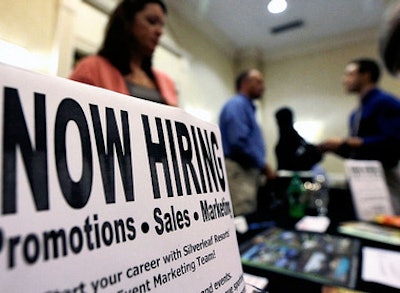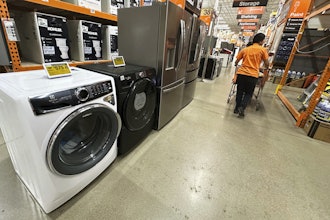
 The number of Americans seeking unemployment aid plummeted to the lowest level in 15 years last week, evidence that employers are laying off few workers despite a sharp slowdown in economic growth.
The number of Americans seeking unemployment aid plummeted to the lowest level in 15 years last week, evidence that employers are laying off few workers despite a sharp slowdown in economic growth.
Weekly applications for unemployment benefits dropped 34,000 to 262,000, the Labor Department said Thursday. That's the lowest level since April 2000. The four-week average, a less volatile measure, dipped 1,250 to 283,750, near a 15-year low.
Applications are a proxy for layoffs, so the sharp fall indicates that employers remain confident enough in the economy to hold onto their workers.
The economy expanded just 0.2 percent at an annual rate in the January-March quarter, down from the 3.6 percent pace in the second half of last year. Fewer layoffs, however, suggests the growth slowdown may be temporary.
If employers anticipated a longer-lasting slump, it is likely that job cuts and applications for unemployment benefits would rise.
"The trend in claims, below the pre-recession trough, continues to impress," Derek Lindsey, an analyst at BNP Paribas, said. It suggests that weak hiring in March "may have been a blip in an otherwise solid trend."
The number of people receiving aid also fell, dropping 74,000 to 2.25 million. That is the fewest since December 2000.
Most economists blame temporary factors, such as a West Coast port strike and harsh winter weather, for the first quarter's slow growth. Consumers cut back on spending and businesses sharply reduced their investment in new oil and gas drilling, in response to cheaper oil. The strong dollar also weighed on exports and widened the trade gap, dragging down growth.
Yet analysts expect that growth will rebound in the April-June quarter to about 2.5 percent.
In addition, hiring was weak in March. Employers added just 126,000 jobs that month, the fewest in 15 months and snapping a yearlong streak of monthly gains above 200,000. The unemployment rate remained 5.5 percent.
Despite those stumbles, unemployment benefit applications are at rock bottom. For those with jobs, the chances of getting laid off are very low.






















